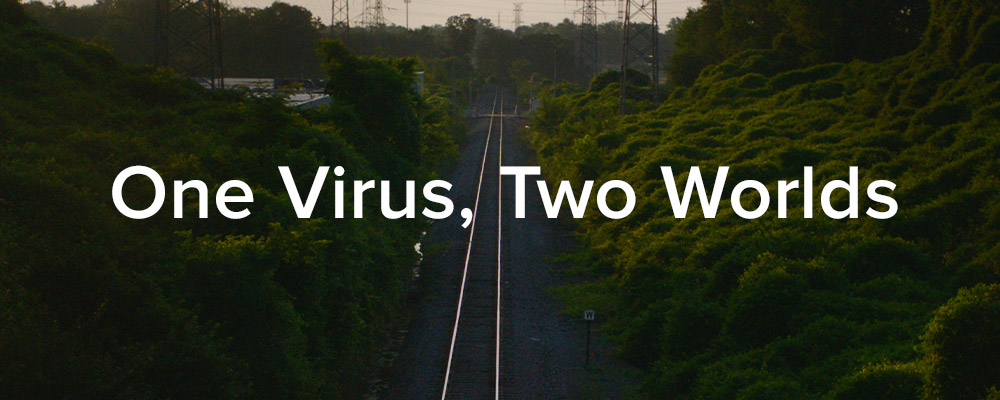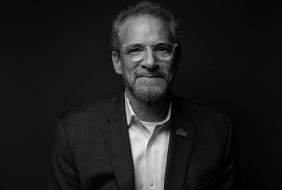There are two distinct worlds within the St. Louis region and elsewhere across our country. They have always existed somewhat independent of one another, but up until now they at least shared some similarities. Now during the coronavirus pandemic, the likenesses seem all but gone. Somehow this virus has dialed up the contrast between these two worlds. The impact of this virus has accentuated and highlighted the differences to such an extreme that they now truly seem worlds apart.
The first world is the larger one that most of us know and inhabit. The current experience of living in this world is not the freefall that happens when your life is suddenly turned upside down; it’s more akin to suspended animation, a state of inertia or limbo as if the coronavirus pressed a universal pause button. For most of us in this world, things have not yet truly gone to hell. Mostly, things are just missed. We miss going to restaurants. We miss sports and events. We miss going to the mall and the movies. We miss things we never thought we would, like offices and schools.
This is not hardship, though. It’s more of a lingering inconvenience. A situation that we’ve so easily adapted to with our video conference calls, our Zoom happy hours with family and friends, and endless Netflix binging to take our minds off the present reality.
Of course, we are concerned about the health of ourselves and our family members. The situation and daily news have elevated our stress. We worry about our jobs, our financial situation and assets, and what the following days and weeks will bring. But even though the pandemic has clouded our sky and cast a melancholy shadow over our world, we have what we need. We have our toilet paper. Our fridges and cupboards are stocked full. As we sit in our homes, we still have the luxury of lifting our heads from our laptops to gaze out the window and notice that the sun still pierces through the gray. When we step out of our quarantine for a walk or a trip to the grocery store, the greening of the trees and the feel of new spring air remind us that all things shall pass, summer is around the corner, and we and our world are ultimately going to be okay.
This is not true hardship. If you want to see that, you have to spend some time in the other world.
This other world is an entirely different situation altogether. It’s also a radically different experience for the people who live there. It always has been but now is even more so.
In this world life has always been a struggle—not for all, but certainly for many. In this world it has always been more difficult to catch a break. When you’re living below or just above the poverty line during the best of times, a once-in-a-century viral pandemic makes daily life that much more brutal.
There have always been few safety nets in this world, and the line between survival and devastation has always been thin. Now with a viral pandemic that is disproportionately infecting and impacting the people here, the bottom is threatening to fall out, revealing a whole new bottom below—and there is little to cushion the fall. As with life, no one ever said that a viral pandemic is fair. Like many other crises before it, this virus is hitting low-income families, low-income communities, and people of color the hardest, and it is difficult for anyone here to hit back.
You would have to try very hard to cross the line into hyperbole in explaining the seriousness of the present situation here.
The low-income jobs many people held didn’t provide a living wage to begin with. Now with many of these jobs furloughed or evaporated into thin air, what little savings many of these families had are gone, and government relief checks are still a few weeks away, if not months. In the meantime, the fridge is empty, the cupboards are empty, and the neighbors’ fridges and cupboards are empty, too.
This is not a world of Zoom happy hours, Netflix marathons, or other diversions. While the rest of us have developed ways to temporarily escape our elevated anxiety, it’s much harder to escape from terror. The reality is too immediate and ever-present. The days are too raw and real. There is no time for distractions. The bulk of mental effort has to be focused on where and how to provide your family’s next meal.
Organizations like ours and our many partners—including the Community Impact Network, Operation Food Search, the Normandy Schools Collaborative, and others in North St. Louis County—have worked for many years in this world. We have seen challenging times before, but we have not seen anything quite like this. Because of this rapidly escalating crisis, we are implementing emergency relief efforts to lessen the impact of this pandemic on these vulnerable families. We are distributing food and supplies and providing rent and utility assistance wherever possible to help these families not only survive during the pandemic but also to give them a fighting chance to recover once it has ended.
But the need continues to outpace the resources available. This is a world where emergency food distributions run out of 450 meals in less than 45 minutes and families still waiting in line have to be referred elsewhere. It’s a world where 20,000 diapers handed out by the St. Louis Area Diaper Bank to needy families are gone in less than two hours. In this world, no matter how optimistic you are, the greening of the trees and the emergence of fresh spring air are not enough to make you feel like all things shall pass and that everything will ultimately be okay.
Just a few days ago, two bus drivers for the Ferguson-Florissant School District passed due to the coronavirus. Their district’s food distributions have been cancelled due to the increased risk. Here in the Normandy schools footprint that we serve, we have been conducting our own food distribution with the Normandy Schools Collaborative and Operation Food Search using school buses to deliver food to thousands of area children. We are now working with the Normandy Schools Collaborative to develop a plan B for this food distribution if something similar happens to us.
It’s good to see that attention is now being drawn to the fact that low-income communities, and the black community in particular, are being disproportionately impacted by this virus. It’s good to see Dr. Anthony Fauci speak about this during the White House briefing just the other day. But it still feels like this isn’t being discussed enough so far. Right now, the heroes fighting on the front line—the doctors, nurses, truck drivers, police, and first responders—are well-deservingly receiving the bulk of our collective praise and attention. But in this war with this invisible enemy, these families and communities are the front lines as much as anyone, and they are suffering the greatest casualties.
It’s always struck me how life can be so drastically different for people who live in communities that are only a few miles apart. Now during the pandemic, the contrast is even more extreme.
The irony is that many of the residents in this world who are hurting so badly were not too long ago the very people who were always there for us in our world. They were the wait staff and cooks, the hotel and hospitality workers, hospital employees, retail staff, and others. They made long daily commutes in ageing cars and on public buses to jobs throughout the St. Louis area that kept our world and our lives running smoothly. They worked at our local Steak ‘n Shake and St. Louis Bread Company. They rang us up at the checkout counter at the mall, cleaned the buildings and places we frequent, and worked our special events. I’ve seen firsthand how many of us take them for granted. Many of us have never taken the time to stop and really think about them.
Within all the scrambling to be there for these families, a few other things have come to mind lately.
One is the book by Studs Terkel, Hope Dies Last: Keeping the Faith in Difficult Times. People are nothing if they do not have hope for a better future. That hope is what fuels us and propels us to strive for a better life. It is the last thing to die, and without it we are nothing. We must do everything we can to help these families keep their hope alive.
Another thing I think about is the refrain that has become universally familiar in the last several weeks. Wherever you turn, there’s the same message from companies and organizations that we’re all in this together—and how, together, we will make it through this. The message may be losing some of its power due to its constant repetition. It’s a good message regardless. I hope our actions will back it up.
Here at home, we have long been a region of two worlds that mainly overlap in a purely perfunctory and transactional manner with little meaningful connections ever established. For the vast majority of us, I don’t believe this is deliberate so much as it is a circumstance of geography, history, and habit.
If there’s an opportunity this pandemic provides us, it’s the chance to make a stronger connection between our two worlds and, just like everybody out there is preaching, to truly come together.
Whatever ambitions we have for St. Louis, we will never get there if we remain divided and leave a significant part of us behind.
And right now, many people desperately need us.


